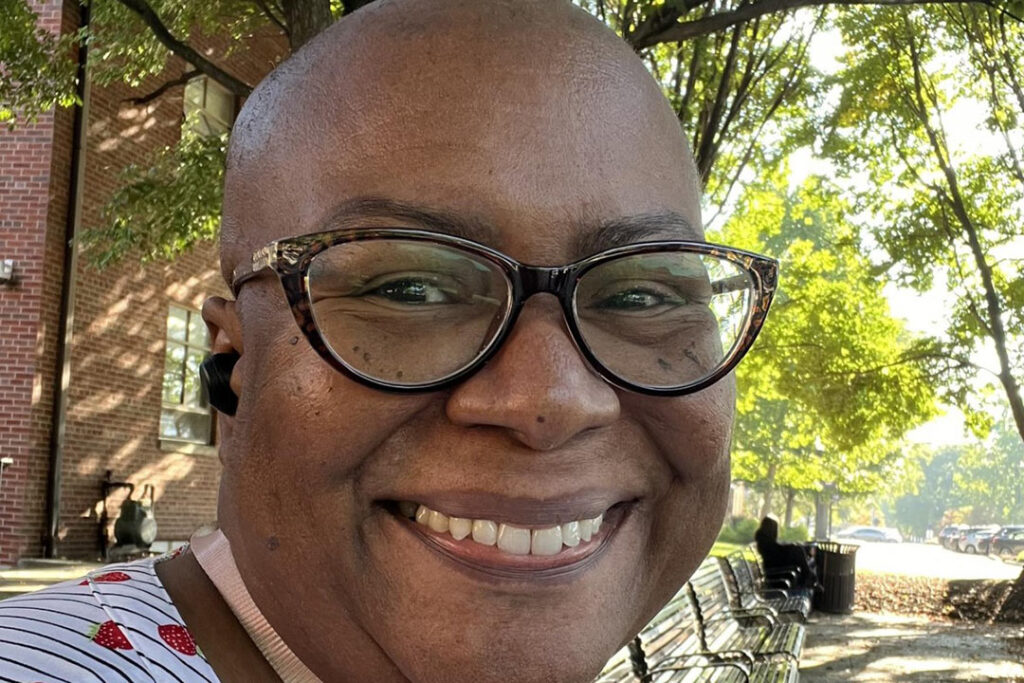Doctoral candidate Denise Rector awarded DSIR Fellowship

LSTC doctoral candidate Denise Rector loves teaching and believes her new fellowship as the Doctoral Scholar in Residence (DSIR) at Trinity Lutheran Seminary at Capital University in Columbus, Ohio, is a perfect fit.
Rector (2021, ThM) said the opportunity is a gift to her teaching and to her dissertation process.
The DSIR fellowship, a creative partnership between the ELCA Quality of Call Initiative for Women in Ministry and Trinity Lutheran Seminary, is awarded to ELCA women of color working to complete their dissertations in theology, biblical studies or religion. The fellowship is intended to support the practical and professional requirements doctoral candidates need to complete their dissertations in fields that serve the ongoing reformation of the church.
Rector will teach a reduced course load while doing her dissertation research and writing. This semester, Rector is teaching Trinity’s course Special Topics: Reframing History for Justice. In this course, students re-examine U.S. history especially through the lens of minoritized groups, lifting up narratives that otherwise might not be heard in church and wider society. In the spring, she’ll teach Ethics. Her classes are both in-person and online.
“Teaching has been an amazing learning experience for me,” Rector said. “I am learning so much from my students as well as my colleagues.”
Rector moved to Columbus in June to prepare to begin teaching Aug. 25. DSIR fellows receive salary and benefits for the two-year period, as well as additional funds for mentoring and professional development.
MDiv provided ministry clarity
Rector, who earned an MDiv from Wartburg Theological Seminary in 2018, realized during that time that becoming a pastor was not her calling. However, the idea of instructing theology courses inspired her. She gained experience as a teaching assistant for Linda E. Thomas, LSTC professor of theology and anthropology, while earning her ThM degree.
“I am so thankful to her for her mentorship and her guidance while I was her teaching assistant,” Rector said.
Womanist theology, race and history is Rector’s area of specialization. U.S. writer and social activist Alice Walker first coined the term “womanist” in her 1983 collection, In Search of Our Mothers’ Gardens: Womanist Prose.
Within the next decade, other theologians would flesh out the principles of womanist theology, a branch of Christian theological discourse that builds on the work of Black theologians such as James Cone. It specifically focuses on the lives and experiences of Black women, and how they experience God and the world. It contrasts with feminist theology, which doesn’t consider the impact of living as Black women and especially as African-American women in its understanding.
“I became interested in the study of womanist theology when I realized that I wasn’t seeing myself – a Black woman – or the history of Black women represented in the teachings of some of the theology classes I was taking,” Rector said. “For a long time, there has been an Americanist religion that doesn’t always reflect the racial and ethical variety of creation.”
Rector’s dissertation will explore the feedback loop between historiography (the writing of history) and epistemology (the area of philosophy concerned with the nature of knowledge and belief) concerning the construction of African-American racial identities throughout U.S. history and in the church.
A vast amount of research exists in her topic area. Her first goal is honing her focus, she said.
“Narrowing my dissertation ideas is probably the most challenging aspect so far,” she said. “Several scholars told me that teaching would help my writing, and that is proving to be the case.”
Rector plans to complete her dissertation in 2024.
Thomas, Rector’s advisor, is delighted that she was named to this position. Rector will provide a different perspective as an instructor, theologian and future professor, she said.
“I am extremely proud [of] Denise [for this award],” Thomas said. “She may be the first ELCA woman of color with a PhD in theology, which is very significant. I am certain that her voice will make a difference in the 21st century.”
This story originally appeared in the Fall 2022 Epistle magazine, written by Gail Kenny, a third year MDiv student and student worker for the Marketing and Communications team.